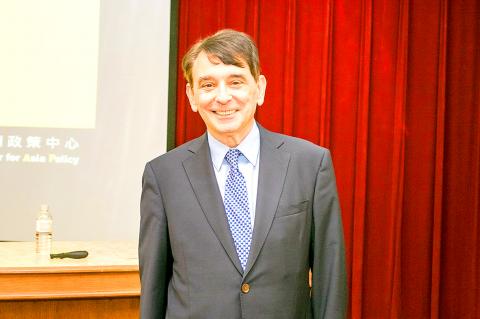Taiwan needs to do more to sell itself to the world, for example by publicizing its achievements in various fields and calling attention to China’s bullying in international media, former American Institute in Taiwan (AIT) director William Stanton said.
He made the remark at a forum in Taipei yesterday when asked how Taiwan should respond to China’s threats in Beijing’s bid to becoming a global hegemony.
“I think you need to undertake much more imaginative public relations with the international community versus what is advocated to people in government,” Stanton said at the forum on Taiwan-US-China relations hosted by Chinese Nationalist Party (KMT) Legislator Jason Hsu (許毓仁).

Photo courtesy of William Stanton
The government could take out full-page advertisements in major newspapers, such as the New York Times, to remind people of what Taiwan has accomplished, he said.
“Taiwan has moved from poverty to prosperity and from a military dictatorship to one of the strongest democracies in the world in just more than 30 years,” Stanton said.
“You rank fourth globally on the Programme for International Student Assessment,” he said. “You rank higher than the US in press freedom and higher than many European countries in academic freedom. You are also ranked one of the safest places in the world, both in terms of countries and cities.”
However, most people he had spoken with do not recognize how high Taiwan ranks in those fields, he added.
“Remind people of what’s at stake if you become just another part of the People’s Republic of China and you wind up like Hong Kong. Remind people of what you’ve achieved on your own. Make the case for why you are important and why the world should care about you,” Stanton said.
Citing as an example threats of a Chinese boycott against Taiwanese coffee bakery chain 85°C (85度C) because an employee at one of its US branches “asked President Tsai Ing-wen [蔡英文] to sign a pillow,” Stanton said the government should respond to such bullying tactics by running full-page editorials in international media explaining the overtures it has made over the past few years, the offers for reasonable conversations and the responses from China to try to bully Taiwanese.
He also cited China’s pressuring of Taiwanese K-pop idol Chou Tzu-yu (周子瑜) in 2016 into issuing an apology for briefly holding up a Republic of China flag on a South Korean variety TV show; its attempt to bar a Taiwanese student from attending a model UN meeting in New York; and Beijing driving away two Fisheries Agency officials at a 2016 UN Food and Agriculture Organization Committee on Fisheries meeting in Rome “because Taiwan is not a country,” saying that all such bullying against Taiwan deserves the attention of the international community.
“There’s many ways in which you can portray yourselves in the positive light you deserve,” Stanton said.

US President Donald Trump yesterday announced sweeping "reciprocal tariffs" on US trading partners, including a 32 percent tax on goods from Taiwan that is set to take effect on Wednesday. At a Rose Garden event, Trump declared a 10 percent baseline tax on imports from all countries, with the White House saying it would take effect on Saturday. Countries with larger trade surpluses with the US would face higher duties beginning on Wednesday, including Taiwan (32 percent), China (34 percent), Japan (24 percent), South Korea (25 percent), Vietnam (46 percent) and Thailand (36 percent). Canada and Mexico, the two largest US trading

AIR SUPPORT: The Ministry of National Defense thanked the US for the delivery, adding that it was an indicator of the White House’s commitment to the Taiwan Relations Act Deputy Minister of National Defense Po Horng-huei (柏鴻輝) and Representative to the US Alexander Yui on Friday attended a delivery ceremony for the first of Taiwan’s long-awaited 66 F-16C/D Block 70 jets at a Lockheed Martin Corp factory in Greenville, South Carolina. “We are so proud to be the global home of the F-16 and to support Taiwan’s air defense capabilities,” US Representative William Timmons wrote on X, alongside a photograph of Taiwanese and US officials at the event. The F-16C/D Block 70 jets Taiwan ordered have the same capabilities as aircraft that had been upgraded to F-16Vs. The batch of Lockheed Martin

GRIDLOCK: The National Fire Agency’s Special Search and Rescue team is on standby to travel to the countries to help out with the rescue effort A powerful earthquake rocked Myanmar and neighboring Thailand yesterday, killing at least three people in Bangkok and burying dozens when a high-rise building under construction collapsed. Footage shared on social media from Myanmar’s second-largest city showed widespread destruction, raising fears that many were trapped under the rubble or killed. The magnitude 7.7 earthquake, with an epicenter near Mandalay in Myanmar, struck at midday and was followed by a strong magnitude 6.4 aftershock. The extent of death, injury and destruction — especially in Myanmar, which is embroiled in a civil war and where information is tightly controlled at the best of times —

China's military today said it began joint army, navy and rocket force exercises around Taiwan to "serve as a stern warning and powerful deterrent against Taiwanese independence," calling President William Lai (賴清德) a "parasite." The exercises come after Lai called Beijing a "foreign hostile force" last month. More than 10 Chinese military ships approached close to Taiwan's 24 nautical mile (44.4km) contiguous zone this morning and Taiwan sent its own warships to respond, two senior Taiwanese officials said. Taiwan has not yet detected any live fire by the Chinese military so far, one of the officials said. The drills took place after US Secretary